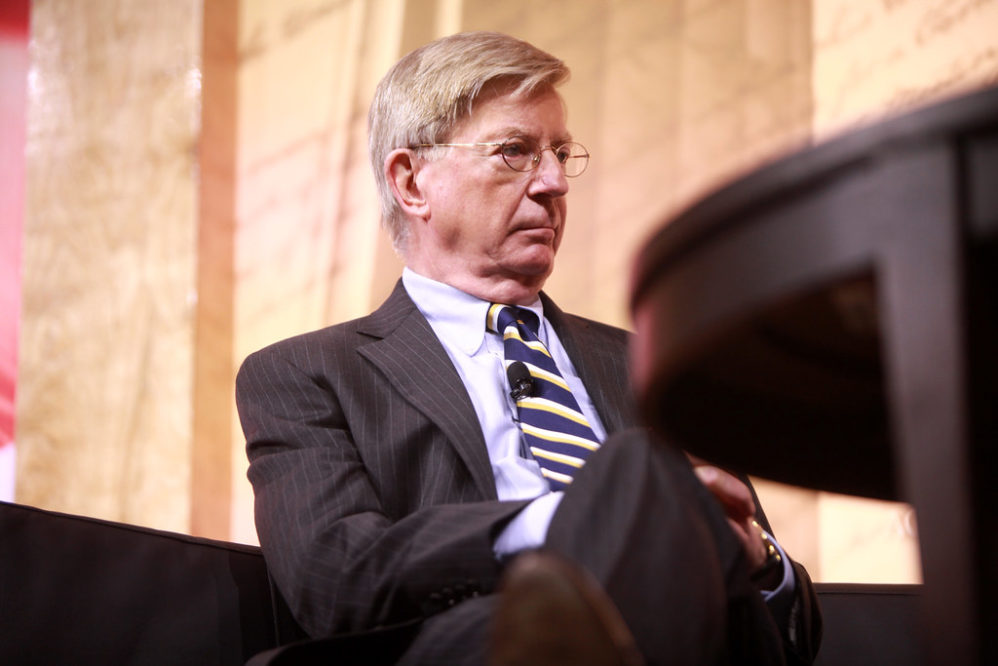No, George Will,
Individual Freedom Is Bigger Than Market Choice

There was a time when I read George Will religiously. My parents gave me a volume of his columns for Christmas when I was thirteen, if I remember. He was my introduction to Aristotle and Edmund Burke, to James Madison and Alexis DeTocqueville. Will was a teacher as well as a commentator in his writing, and I learned much from him. And back then, he was still a conservative.
Times change. These days Will spends his columns sneering at Donald Trump and the rural, “non-college-educated” working class, bashing pro-worker trade policies and pro-family tax reforms. And in today’s installment, he dismisses my call to revive American community as an affront to capitalism and—wait for it—individual liberty! It must be hard being so angry all the time.
Will’s fulminations are typical of a certain set of Clinton and Bush-era commentators who call themselves “conservative” but sound more like a cartoon version of libertarianism. Will shrugs at the decline of the working class and the loss of the communities that sustain them. He celebrates instead the “spontaneous order of a market society,” by which he apparently means woke capital, offshoring, and the growing corporatist alliance between big government and big business.
Will advises working families displaced by lost jobs and neighborhoods to shut up and move, like the Joad family in Steinbeck’s “Grapes of Wrath.” Packing up all their belongings and abandoning their family farm demonstrated the Joads’ “dignity,” Will opines. Interesting. He might want to re-read Steinbeck.
Or Edmund Burke. Will casts himself as a champion of individual liberty, but his reduction of individual freedom to market choice—the right to buy cheap stuff from China—wouldn’t have made any sense to Burke. (Or the American founders. Or the voters who cast their ballots for Donald Trump.)
Burke understood that individual freedom is formed by culture and community, and you have to work to defend both. The “little platoons,” Burke said—home and church, school and neighborhood—are where we grow, where we learn to love, where we find the strength and support to make something of our lives. And they are where we forge the common bonds that sustain our national sense of purpose.
The problem today is that our little platoons are faltering under relentless pressure from the “global economy” that Will loves and China exploits and the ceaseless denigration of cultural elites.
Statistics tell us we face an epidemic of loneliness and isolation across all segments of our society. Deaths of despair are soaring. Suicides, drug overdoses, and alcoholism together claim more lives now than ever in our history. And Americans’ participation in civic groups and social gatherings continues to decline, even as whole neighborhoods and towns wither.
As the little platoons fade, so too does our sense of individual agency and national belonging. More Americans report feeling powerless and unheard than ever before. Burke would have understood why. Without the fellowship of our shared communities, “no one generation [can] link with the other,” Burke said. “Men would become little better than the flies of summer.”
There are many causes of this crisis, including faulty economic and trade policy that has favored the highly educated “front row” over the working class for decades, and a conception of freedom pushed relentlessly by academia and cultural leaders that denigrates community, church, and home.
Will is offended I would broach any of these subjects. He purports not to recognize the facts I describe. He really ought to get out more. The “individualism” he lauds as a theory is in fact much more than that. It is a way of life that needs defending. It’s a shame he won’t defend it any longer.
